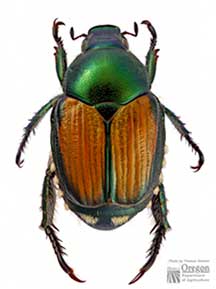 |
Previous Issues |
| Cedar Mill Community Website |
|
Search the Cedar Mill News: |
About The Cedar Mill News |
|
|||||||
| Volume 14, Issue 9 | September 2016 |
||||||
Japanese beetle infestation hits Cedar Mill
|
|||
 |
“What we know right now is that this infestation is localized, yet producing enough adult beetles that we can find them feeding on roses and other plants in this area,” says Clint Burfitt, manager of ODA’s Insect Pest Prevention and Management Program. “Without community action, this pest will spread and cause an increased use of pesticides by homeowners and producers of agricultural crops, such as cannabis, hops, nursery plants, and wine grapes.”
These insects especially like roses, dahlias, beans, grapes, and raspberries and will attack a variety of the fruit trees. Their life cycle begins as an egg, develops into a larvae (also called a grub), then a pupa, and finally a half-inch-long adult beetle with a shiny metallic green head and thorax with copper wing covers. The adult beetles proliferate quickly and the female lays up to five eggs daily. They can fly short distances.
The beetle grubs winter in soil where they consume the roots of plants and grass, creating brown spots in lawns. Adult beetles emerge in late spring.
You may have already noticed damage done by the beetles in your garden. In the morning and early afternoons, beetles feed on plant leaves, creating leaf skeletons with veins exposed and flower petals with ragged edges or holes.
Our current infestation can easily spread to surrounding areas if appropriate actions are not taken. The Oregon Department of Agriculture plans to begin spraying this coming spring. Residents may be asked to cooperate to allow them to hang traps in their lawns and to spray. Also, residents may help by surveying their own yards. If beetles are found, drop them into a pail of soapy water to drown them.
Lawns may be treated with a natural bacterial predator—milky spores that are specific to Japanese beetle grubs. You can learn more about Japanese beetles at this website www.almanac.com/pest/japanese-beetles,.
More information will be forthcoming from ODA next spring, and we’ll bring you the information when we get it.
![]()
Like us on Facebook for timely updates
Published monthly by Pioneer Marketing & Design
Publisher/Editor:Virginia Bruce
info@cedarmillnews.com
PO Box 91061
Portland, Oregon 97291
© 2016